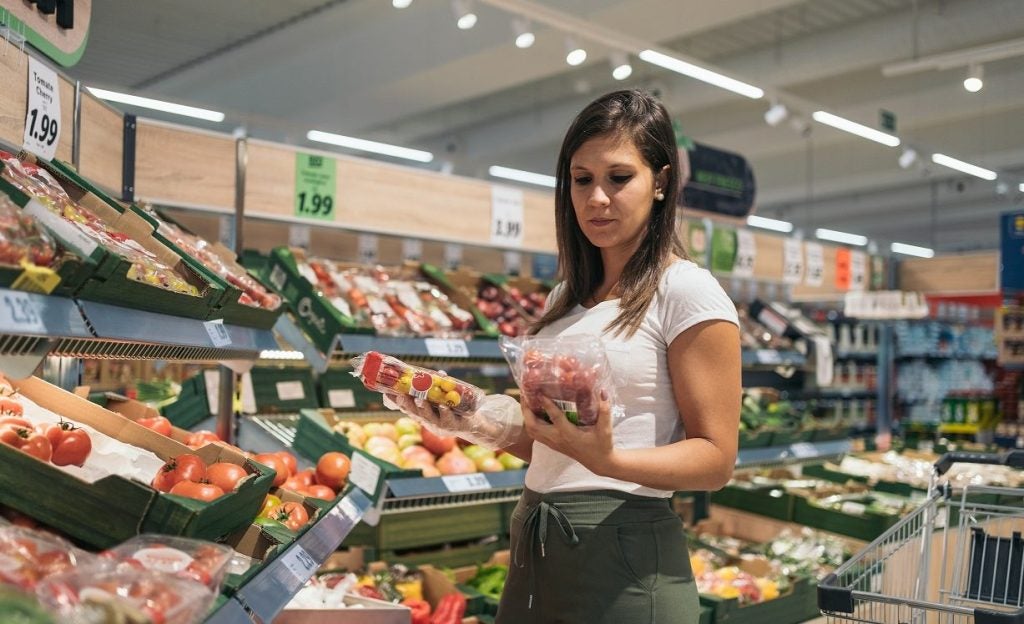The EU has agreed on a provisional deal to create a new law to cut packaging waste and ban single-use plastics such as those used for supermarket fruit and vegetables.
Negotiators from the European Parliament and Belgium, which holds the six-month rotating EU presidency, agreed yesterday (4 March) on targets to reduce packaging by 5% by 2030 and 15% by 2040 and that all packaging should be recyclable by 2030.
The EU said the deal, which will need to be ratified by the European Parliament and EU governments, is necessary because “even though recycling rates have increased in the EU, the amount of waste generated from packaging is growing faster than the amount recycled”.
It added: “Over the past decade, the amount of packaging waste has increased by nearly 25% and is expected to increase by another 19% by 2030 if no action is taken. For plastic packaging waste, the expected increase is 46% by 2030.”
The bloc generated 188.7 kilograms of packaging waste per inhabitant in 2021 – 10.8 kg more per person than in 2020.
The EU proposed a revamp of rules governing packaging waste two years ago, largely because of those increases, driven partly by the rapid increase in online shopping and the proliferation of ‘grab and go’ products.
If the new rules are ratified, they will replace the existing directive, which was first adopted in 1994 and has been revised several times.
Items affected will include sauce sachets and disposable plates, cups and boxes used by fast food restaurants.
There will also be a ban on "forever chemicals" (per- and polyfluorinated alkyl substances or PFASs) in food contact packaging.
European MP Frédérique Ries, who was involved in the negotiations, described the deal as a “great victory for the health of European consumers”.
Last month, the European Commission, the EU’s lawmaking arm, launched a consultation process on a proposed ban of the use of the Bisphenol A (BPA), a chemical used in food and drink packaging.
This followed findings from the European Food Safety Authority (EFSA), which indicated a “concern for human health”.
In the provisional deal announced yesterday, the EU also wants to up re-use targets, such as 10% for takeaway packaging and for drinks containers, except those for wine or milk.
In its statement announcing the deal, the EU said: “The proposal considers the full life-cycle of packaging. It establishes requirements to ensure that packaging is safe and sustainable, by requiring that all packaging is recyclable and that the presence of substances of concern is minimised.”
It added: “In line with the waste hierarchy, the proposal aims to significantly reduce the generation of packaging waste by setting binding re-use targets, restricting certain types of single-use packaging and requiring economic operators to minimise the packaging used.”
The new rules exempt micro-enterprises from attaining the targets it has set out.
The campaign group Zero Waste Europe welcomed what it described as “good steps”, especially in relation to the chemicals used in food packaging.
Dorota Napierska, its toxic-free circular economy policy officer, said: “This will hopefully also send a clear message to food packaging manufacturers that all other substances of concern that we currently find in food packaging should also be eliminated in the coming years.”
But, on a less positive note, the organisation expressed its “deep concern with some worrying exemptions” to the benefit of paper-based and composite packaging applications.
Meanwhile, Philippe Binard, general delegate of industry association Freshfel Europe, told industry title Fruitnet the ban was poorly conceived, discriminatory and probably illegal.
“We don’t see a reason to ban packaging for fruits and vegetables, specifically not plastic packaging for fruits and vegetables,” he said, suggesting there will be legal challenges to the move.









